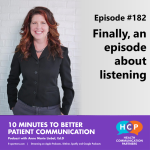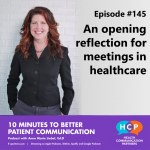Today, communicating across our differences is both difficult and necessary.
The more divisive the dominant rhetoric becomes, the more we need to look to each other for connection.
The more we’re told it’s really an “us versus them” fight, the more we need to question those misleading and false binaries.
But this is hard work. What can we do?
One very wise colleague told me this week, take good care of yourself and be sure to put the oxygen mask on yourself first. Do what you need to do to take good care of you. Then you can help others.
In that spirit, here is some inspiration for how we all can communicate across difference.
Why Should I Trust You?
Inside A Rare Conversation Between MAHA Grassroots and Public Health Leaders
This month I saw and heard two episodes of this weekly podcast Part 1 and Part 2 of this conversations between Public Health leaders and MAHA representatives. I’ll admit I had to get in the right frame of mind to listen to them and honestly did so in small doses. But there’s much to appreciate here. The hosts begin by acknowledging that the two sides represented here tend to talk about each other, and past each other, but rarely to each other. They also point out, helpfully, that communication across opposing political groups is made more difficult by misconceptions that one group has about the other, and by how we are often quite silo’ed.
Conversations with People Who Hate Me
From the website, “Don’t be fooled by the title! It’s actually a loving show that fosters unlikely connections in an age of increasing digital isolation.” Maybe you heard this when it made a stir and grabbed awards in pre-covid times, but Dylan Marron’s Conversations With People Who Hate Me might be worth a re-listen in today’s environment.
Finally, an episode about listening
I read from Professor Katherine Schultz’s book on listening, and we do a quick exercise to help you think about improving your listening.
An opening reflection for meetings in healthcare
Find out why this was one of the most popular episodes of the year in 2023. Jim Gee’s words invite us to slow down and consider what we’re hearing when people speak.




